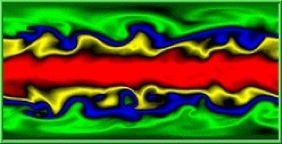Geophysical Fluid Dynamics
G63.2830.002 ADVANCED TOPICS IN APPLIED MATHEMATICS - GEOPHYSICAL FLUID DYNAMICS FALL 2007
INSTRUCTOR: OLIVIER PAULUIS

Geophysical fluid dynamics is the branch of fluid dynamics that investigates the large-scale flows in the atmosphere and oceans. These flows are characterized by the preponderant role of planetary rotation and stratification. Through this course, we will discuss the governing equations and the traditional approximations used in the atmospheric and oceanic sciences, and analyze the effects of rotation and stratification through the study of specific phenomena. Topics include: vorticity dynamics, geostrophic balance and quasi-geostrophic flows, gravity and Rossby waves, flow instabilities and turbulence. A strong emphasis will be placed on applied mathematical techniques suitable for the study of geophysical flows: perturbation expansions, multiple-scale analysis, and the WKB approximation. As part of a term project, students may choose an experimental, computational, or theoretical problem analyzing a specific type of flows such as monsoonal circulation, hurricanes, convection and baroclinic eddies.
Text: Atmospheric and Oceanic Fluid Dynamics: Fundamentals and Large-Scale Circulation, G.K. Vallis, Cambridge University Press, 2006
Supplementary texts: Lectures on Geophysical Fluid Dynamics , Rick Salmon; Geophysical Fluid Dynamics, Joseph Pedlosky
Course Description:
Welcome
This Fall, I will be teaching this fall a special topic course on Geophysical Fluid Dynamics. It is aimed at any graduate students interested in studying the circulation of the atmosphere and oceans. This is an introductory class and most students at the Courant should be able to take it in their first year or second year. There is no specific requirement, but some background in fluid dynamics and partial differential equation would be handy.



